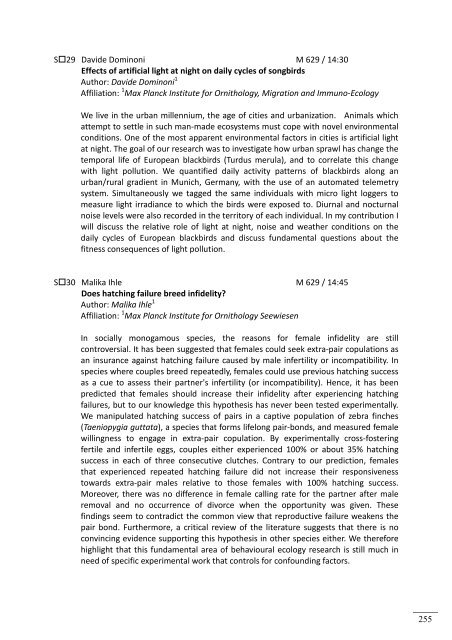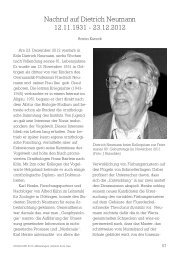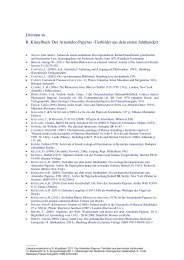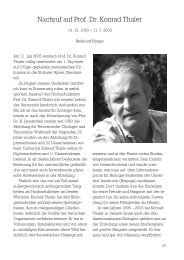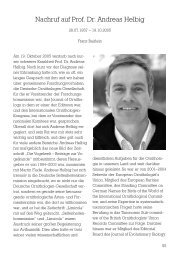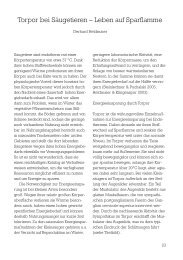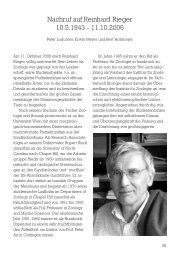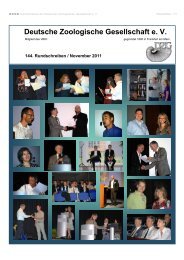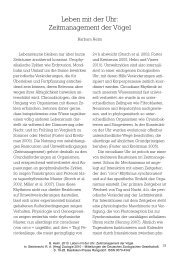2. Behavioral Biology TALKS - Deutsche Zoologische Gesellschaft
2. Behavioral Biology TALKS - Deutsche Zoologische Gesellschaft
2. Behavioral Biology TALKS - Deutsche Zoologische Gesellschaft
You also want an ePaper? Increase the reach of your titles
YUMPU automatically turns print PDFs into web optimized ePapers that Google loves.
S�29 Davide Dominoni M 629 / 14:30<br />
Effects of artificial light at night on daily cycles of songbirds<br />
Author: Davide Dominoni 1<br />
Affiliation: 1 Max Planck Institute for Ornithology, Migration and Immuno-Ecology<br />
We live in the urban millennium, the age of cities and urbanization. Animals which<br />
attempt to settle in such man-made ecosystems must cope with novel environmental<br />
conditions. One of the most apparent environmental factors in cities is artificial light<br />
at night. The goal of our research was to investigate how urban sprawl has change the<br />
temporal life of European blackbirds (Turdus merula), and to correlate this change<br />
with light pollution. We quantified daily activity patterns of blackbirds along an<br />
urban/rural gradient in Munich, Germany, with the use of an automated telemetry<br />
system. Simultaneously we tagged the same individuals with micro light loggers to<br />
measure light irradiance to which the birds were exposed to. Diurnal and nocturnal<br />
noise levels were also recorded in the territory of each individual. In my contribution I<br />
will discuss the relative role of light at night, noise and weather conditions on the<br />
daily cycles of European blackbirds and discuss fundamental questions about the<br />
fitness consequences of light pollution.<br />
S�30 Malika Ihle M 629 / 14:45<br />
Does hatching failure breed infidelity?<br />
Author: Malika Ihle 1<br />
Affiliation: 1 Max Planck Institute for Ornithology Seewiesen<br />
In socially monogamous species, the reasons for female infidelity are still<br />
controversial. It has been suggested that females could seek extra-pair copulations as<br />
an insurance against hatching failure caused by male infertility or incompatibility. In<br />
species where couples breed repeatedly, females could use previous hatching success<br />
as a cue to assess their partner's infertility (or incompatibility). Hence, it has been<br />
predicted that females should increase their infidelity after experiencing hatching<br />
failures, but to our knowledge this hypothesis has never been tested experimentally.<br />
We manipulated hatching success of pairs in a captive population of zebra finches<br />
(Taeniopygia guttata), a species that forms lifelong pair-bonds, and measured female<br />
willingness to engage in extra-pair copulation. By experimentally cross-fostering<br />
fertile and infertile eggs, couples either experienced 100% or about 35% hatching<br />
success in each of three consecutive clutches. Contrary to our prediction, females<br />
that experienced repeated hatching failure did not increase their responsiveness<br />
towards extra-pair males relative to those females with 100% hatching success.<br />
Moreover, there was no difference in female calling rate for the partner after male<br />
removal and no occurrence of divorce when the opportunity was given. These<br />
findings seem to contradict the common view that reproductive failure weakens the<br />
pair bond. Furthermore, a critical review of the literature suggests that there is no<br />
convincing evidence supporting this hypothesis in other species either. We therefore<br />
highlight that this fundamental area of behavioural ecology research is still much in<br />
need of specific experimental work that controls for confounding factors.<br />
255


